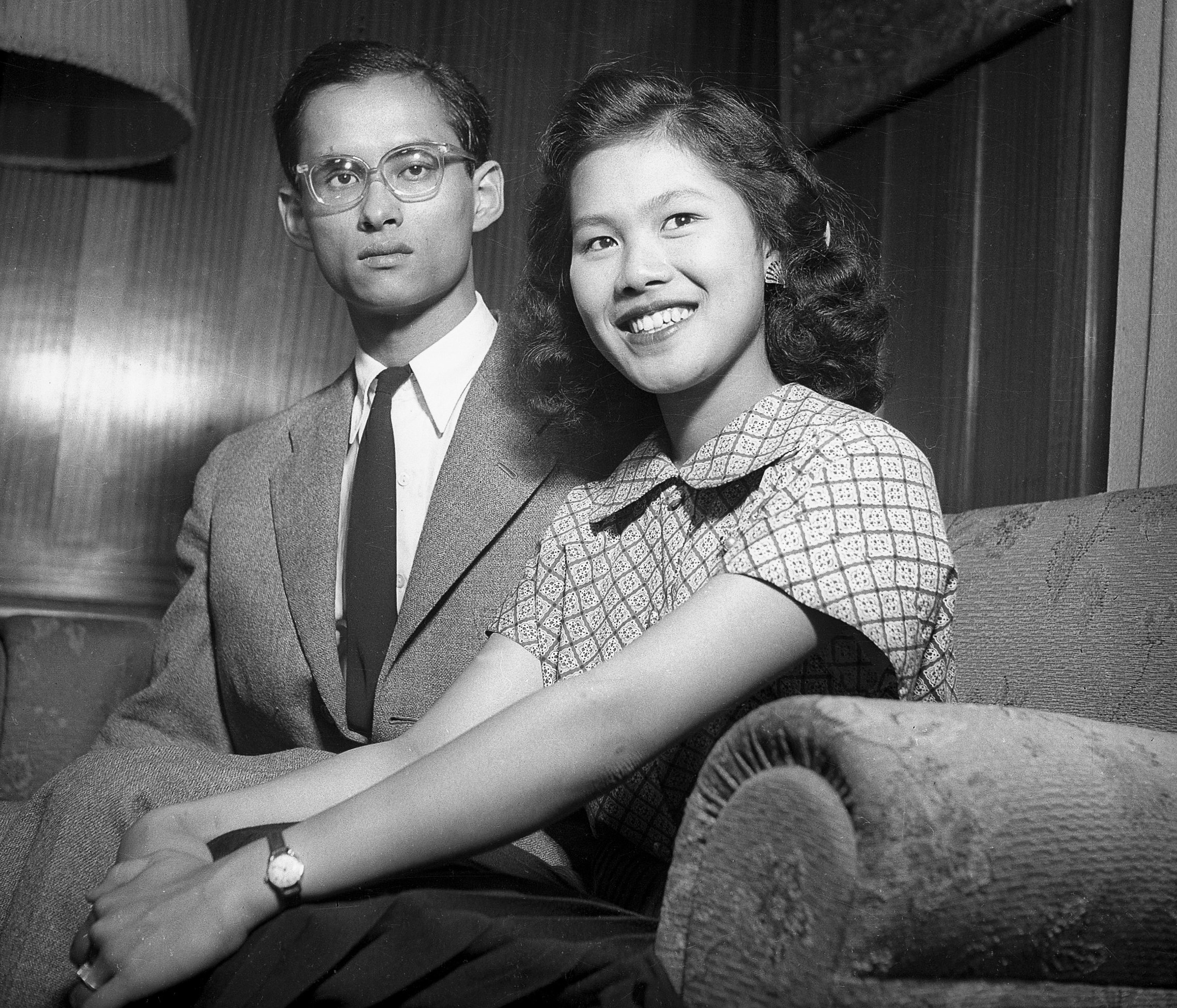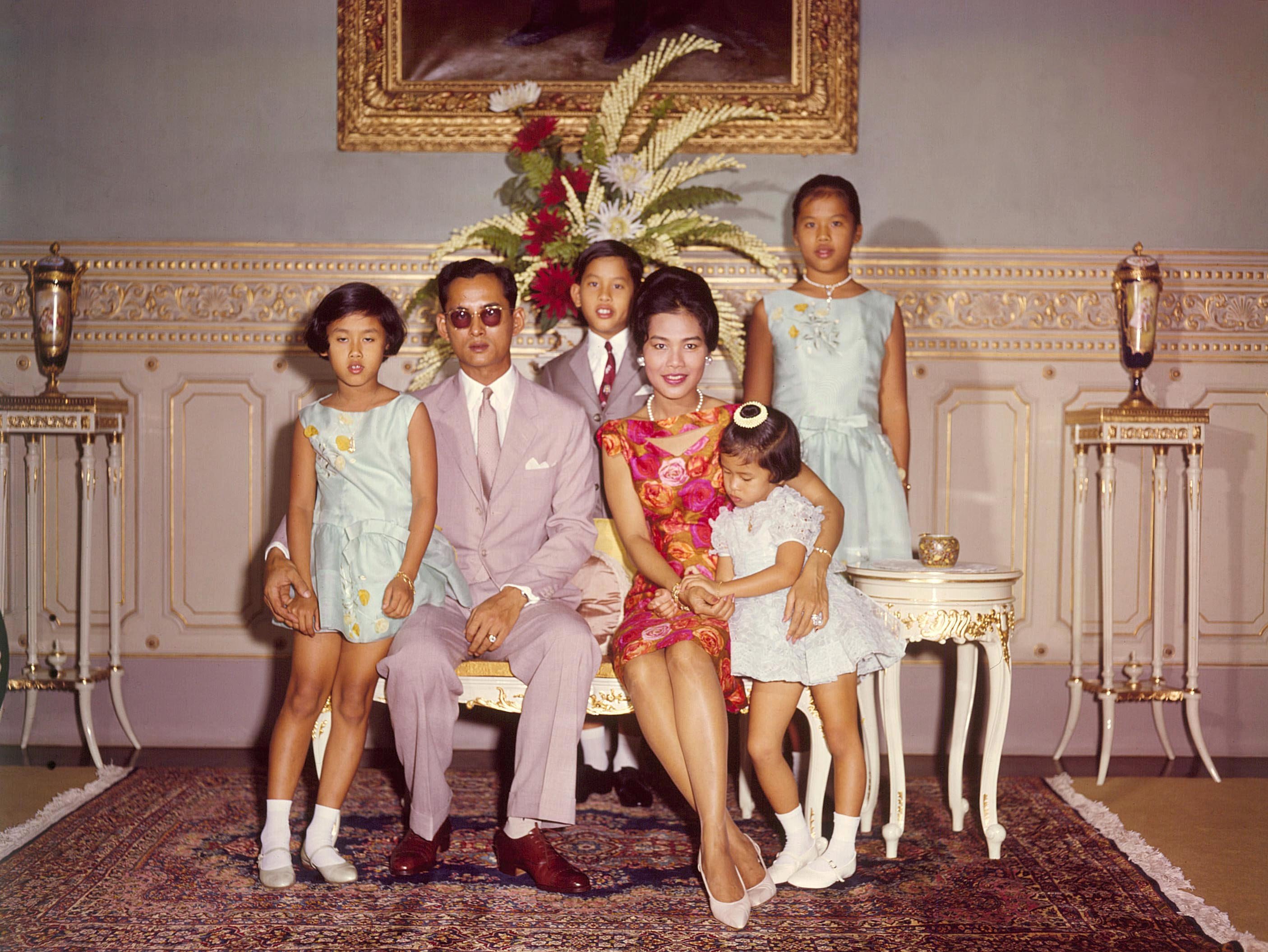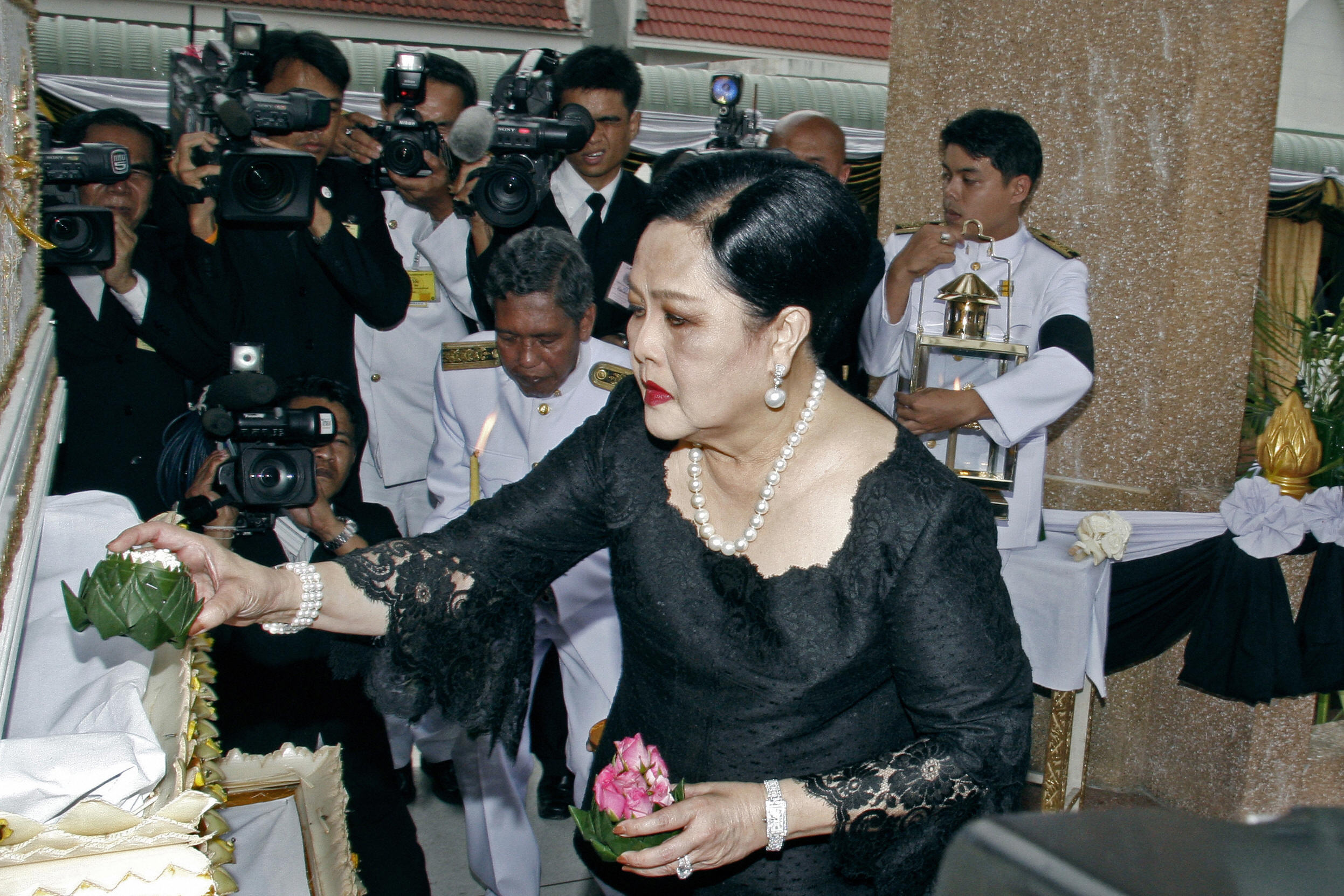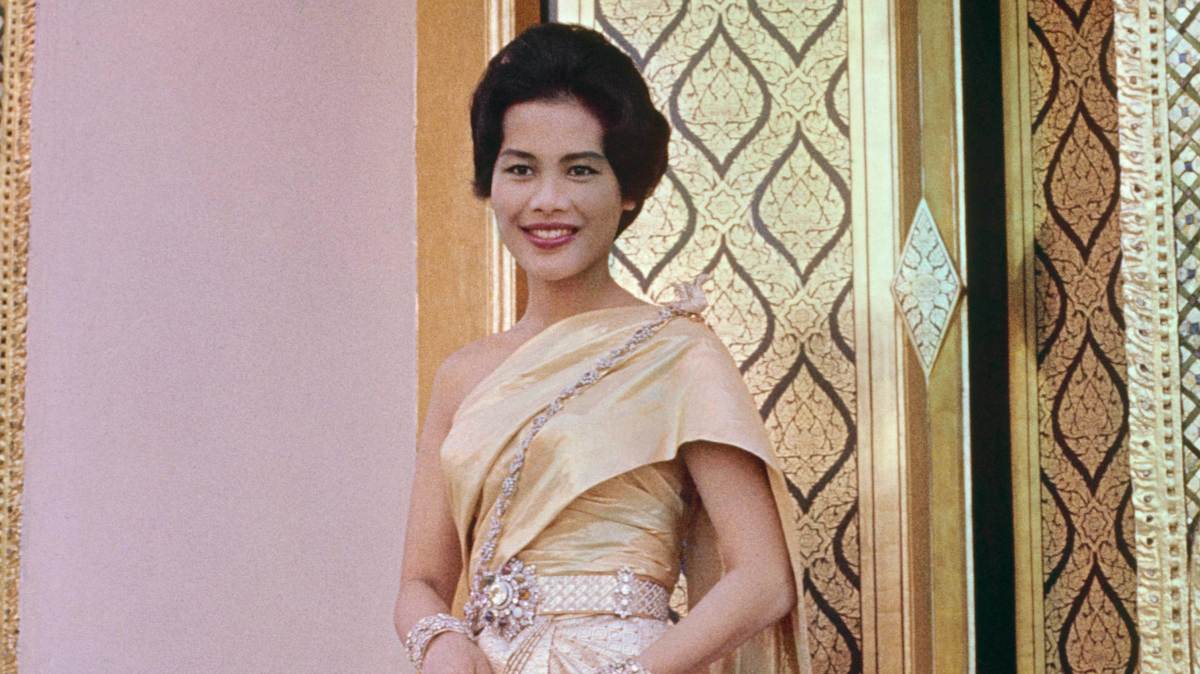The two-day state visit to Britain by King Bhumibol and Queen Sirikit of Thailand in July 1960 was a colourful occasion. They gave Queen Elizabeth a teak elephant with ivory tusks weighing more than 400lb (180kg) and in return received a silver-gilt coffee set. As rain fell during the open-carriage procession from Victoria station to Buckingham Palace, the Duke of Edinburgh held an umbrella over the Thai queen, who at that evening’s state banquet dazzled the palace guests in national dress, her gold-brocade skirt pleated in front and held by a gold belt with a jewelled buckle.
A feisty, fashionable and charismatic figure, Sirikit met American presidents and celebrities from President Dwight Eisenhower to Elvis Presley and frequently headed the International Best-Dressed List. She was known as “Asia’s Jackie Kennedy” and in 1967 hosted the former US first lady at a glittering dinner in Bangkok. One profile noted: “Exotic and exquisite as an ivory figurine, Sirikit is the perfect foil for the sultry, whispering beauty of Thai silk”, a product whose international reputation she restored by collaborating with Pierre Balmain, the French designer.
At home Sirikit was a powerful force in a country whose constitutional monarchy, like that of Britain, has no official political role yet wields great influence. She provided financial support for pro-royal demonstrators and in 2008 attended the funeral of a 28-year-old anti-government protester killed by police firing tear gas into a crowd. In 1992 she granted amnesty to Karl Maxwell-Smith, 62, a Scottish sales engineer who had served five years of a 100-year sentence for murdering his Thai wife.

The Thai royal couple’s state visit to Britain in 1960 saw them take an open carriage to Buckingham Palace
CENTRAL PRESS/HULTON ARCHIVE/GETTY IMAGES

Through her Support Foundation she visited rural areas, earning the nickname the “green queen” for her promotion of environmental causes and Thai handicrafts. On these visits she often met women, children and the sick. “She would give them medicine and tell them to take care of themselves, speaking slowly and simply like a mother giving instructions to a four-year-old, the way she talked to everyone outside the palace,” Paul Handley, the king’s biographer, wrote in The King Never Smiles (2006).
As Bhumibol’s health deteriorated in the 1980s, Sirikit’s influence grew. In April 1983 a Times reporter described how the queen, her entourage of generals and a few civilian advisers were effectively governing Thailand through regular dinners in which the king did not participate. She supported General Arthit Kamlang-ek in crushing the 1981 April Fools’ Day coup, broadcasting a radio appeal for unity, and took part in the traditional bathing ceremonies after the death of Arthit’s wife from a brain tumour. As one Bangkok wit put it at the time: “We live in Camelot with the Queen and her knights.”
Sirikit Kitiyakara was born in Bangkok in 1932, shortly after the Siamese revolution ended the country’s absolute monarchy. She was the third of four children of Prince Nakkhatra Mangala Kitiyakara, a diplomat, and his wife Bua Snidvongs, an actress; her two older brothers predeceased her. The name Sirikit means “goodness” and since 1976 her birthday, August 12, has been marked as Mother’s Day in Thailand.
She was educated by the Sisters of St Paul of Chartres at St Francis Xavier’s convent school, Bangkok, moving to London in 1946 when her father was appointed ambassador. Here she studied English, French and piano, continuing her music lessons when her father was posted to Paris. There she met the American-born Bhumibol, a distant relation whose many titles included “half-brother of the Sun” and who was completing his education in Switzerland.

Sirikit was 16 when she and King Bhumibol got engaged
RDB/DUKAS/UNIVERSAL IMAGES GROUP/GETTY IMAGES

With her family in 1962. The current king, Rama, is standing behind her
PIERRE PAPWORTH/SHUTTERSTOCK
Bhumibol’s Eton-educated uncle, King Prajadhipok, had abdicated in 1935 and in 1946 his elder brother Ananda Mahidol, who had succeeded to the throne at the age of nine, was found dead with a bullet in his head and a revolver by his side. The Thai government unanimously selected Bhumibol to succeed Ananda as king, appointing a three-member council of regency to guide the new monarch whose coronation was delayed until his formal education was complete.
Sirikit’s first meeting with Bhumibol was a case of “hate at first sight … because he said he would arrive at four o’clock in the afternoon”, she told a BBC documentary about the Thai monarchy in 1980. “He arrived at seven o’clock, kept me standing there, practising curtsy and curtsy.” Their next encounter was in 1948 after Bhumibol lost his right eye when crashing his car into the back of a lorry in Switzerland. “It was love,” she said. “I didn’t know that he loved me, because at that time I was only 15 years old, and planned to be a concert pianist. He was gravely ill in the hospital … He produced my picture out of his pocket, I didn’t know he had one, and he said, ‘Send for her, I love her’.” She stayed with him, switching to a school in Lausanne.
Their engagement was announced at her 17th birthday party in London, where Bhumibol played solo piano and accompanied the dance band on his saxophone, though Sirikit later confessed to preferring Mario Lanza to jazz. They were married in a simple Buddhist ceremony on April 28, 1950, an occasion described by The New York Times as “the shortest, simplest royal wedding ever held in the land of gilded elephants and white umbrellas”, though her parents had to sign the marriage certificate because she was still under 18. Bhumibol was crowned king a week later and in turn crowned her queen.

At the funeral of an anti-government protester in 2008. She was accused of politicising the monarchy
STR/AFP/GETTY IMAGES
There were rumours that her husband had several lovers, including Sirikit’s sister Busba, who survives her. Sirikit too was known for her indiscretions, surrounding herself with handsome army officers including a young colonel who became her travel companion. Yet according to Handley: “Nothing has ever blemished the public picture of a happily married, monogamous royal couple.”
Sirikit was rarely far from the political machinations of her country. Diplomatic cables revealed by WikiLeaks in 2010 suggest she was behind a military coup in 2006 that forced Thaksin Shinawatra, the prime minister, from office. They also suggested that she and Bhumibol differed in their support for the People’s Alliance for Democracy, or Yellow Shirt movement, a coalition opposed to Thaksin. “Queen Sirikit, departing from the example set by King Bhumibol over decades, has dragged an ostensibly apolitical monarchy into the political fray, to the institution’s probable future detriment,” noted a 2008 dispatch by Eric John, then the US ambassador.
In 2012 she suffered a stroke and thereafter was rarely seen in public. Bhumibol died four years later (obituary, October 13, 2016) and was succeeded by their son Vajiralongkorn (King Rama X), a one-time playboy whose love life Sirikit meddled in. She is survived by him and their other children: Princess Ubol Ratana, a pop singer who once tried to stand as prime minister, Princess Sirindhorn and Princess Chulabhorn.
In her 1980 BBC interview Sirikit alluded to her own periods of poor health while describing the relationship between the royal family and people in Thailand, a country where strict lèse-majesté laws forbid insulting the monarchy. “To give, not to take, only to give; to love, so that is the reason my husband and I can work, year after year, day after day,” she said. “We have been ill. But we know that when it is time to die nobody can escape.”
Sirikit, queen mother of Thailand, was born on August 12, 1932. She died from a blood infection on October 24, 2025, aged 93

